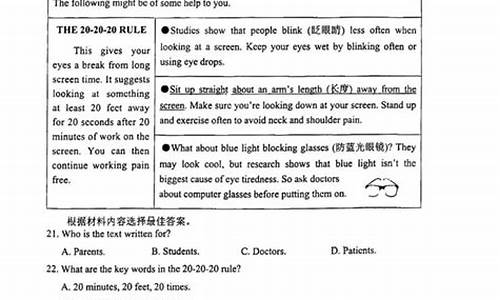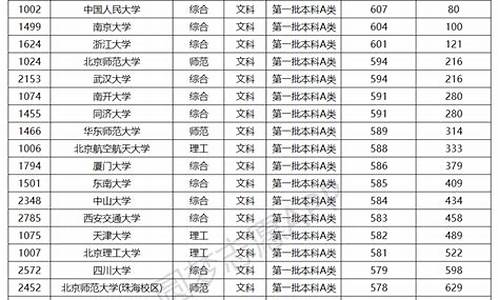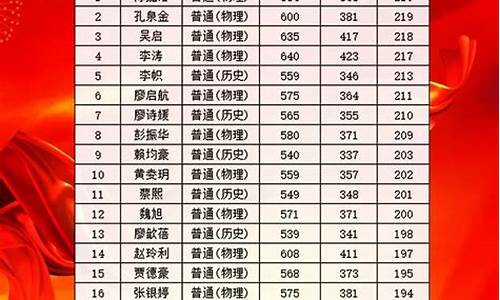2017年河南省英语中考试卷答案,河南2017英语答案高考
1.2017年高考英语全国卷1 - 阅读理解B
2.河北英语高考题2017年
3.2017届全国100所名校最新高考模拟示范卷英语卷二的答案,谢谢,跪求
4.2017高考英语词汇详解:arrange的用法

三好网高考英语一对一辅导名师分享2017高考英语完形填空的解题技巧供高三考生们参考。
1.依据上下文确定答案的法则:从近几年的完形填空题看,近义词或近义短语的测试力度逐渐加强,并成为测试热点。四个选项不是词义相近,要不就是近义动词的同一种时态的现象,或名词的单复数搭配。若选项词义差异很大,必然文章中藏有提示语,正因如此,往往第一个选项有时需要读完全篇短文才能准确回答。
2.词语语义与强于语法原则:完型填空题的首句不留空,目的就是告知短文的故事的四要素:地点、时间、人物和事由。再则,单纯语法题已基本退出该题型的测试范畴,所以,指导学生时,首先要告知他们这类现象。尽管四个选项的词语都符合语法规则,然而该题的解答必须遵循先全面理解篇章语义,再结合正确语言结构对每个空格作出准确无误的抉择。
3.解题四步法原则:
第一步:跳读。带着空格通读全文,了解短文大意,判别短文文体,同时能将会做的题及时解决掉。
第二步:选答。这一步最为关键,要求考生对每一道题进行认真推敲,但是要告诫他们万万不可按照题的顺序答题,对那些不能拿不准的题先跳过去,遵循先易后难的解题原则。
第三步:推敲。这实际上就是要求考生对完形填空短文的篇章作通盘考虑,把其中一些需要依据上下文语境来考虑的比较难解答的题,以及句子之间和段落之间的逻辑关联较强的认真推敲,甄别,筛选和抉择。
第四步:复查。这是解答这类题的最后一步,要求考生解完题之后务必再把文章通读一遍,从整体上准确把握文章的真正意思,及时修改与全文有出入的一些选项。
2017年高考英语全国卷1 - 阅读理解B
第一个的话我觉得and也行,and是和的意思,可以表示对等,我觉得有时候也是引出补充说明句子,so吧也可以,主要是前后因果关系不是很强烈,住得远并不一定是要花1.5个小时到学校,住得远的果应该是上班路上时间长逻辑才算通顺,这是可改可不改的。
第二个,我认同你的说法,逗号后面是非限制性定语从句,要用which,不过前面interesting错的也很明显,感觉题出错了。
河北英语高考题2017年
I work with Volunteers for Wildlife, a rescue and education organization at Bailey Arboretum in LocustValley. Trying to help injured, displaced or sick creatures can be heartbreaking; survival is never certain. However, when it works, it is simply beautiful.
我在“野生动物志愿者”组织工作,这是蝗虫谷贝利植物园的一个援救教育组织,帮助受伤、流离失所或生病的动物。这样的工作可能会令人心碎;因为无法确定动物是否能活下来。然而,当救援起作用时,这种感觉真的很棒!
I got a rescue call from a woman in Muttontown. She had found a young owl on the ground. When I arrived, I saw a 2-to 3-week-old owl. It had already been placed in a carrier for safety.
我接到马特顿镇一位女士的求救电话,她在地上发现了一只猫头鹰幼鸟。当我到达时,我看见了一只两三周大的猫头鹰。为了安全起见,它已经被放在一辆大货车上。
I examined the chick and it seemed fine. If I could locate the nest, I might he been able to put it back, but no luck. My next work was to construct a nest and anchor it in a tree.
我检查了这只幼鸟,看起来还不错。如果我能找到鸟巢,我也许能把它放回去,但没那么。接下来的工作就是建造一只鸟巢,并固定在一棵树上。
The homeowner was very helpful. A wire basket was found. I put some pine branches into the basket to make this nest safe and comfortable. I placed the chick in the nest, and it quickly calmed down.
房主非常乐于助人,给我找来了一只铁丝篮。为了让鸟巢安全舒适,我把一些松枝放进铁丝篮里,然后我把小猫头鹰放进鸟巢里,它很快安静了下来。
Now all that was needed were the parents, but they were absent. I ge the homeowner a recording of the hunger screams of owl chicks. These advertise the presence of chicks to adults; they might also encourage our chick to start calling as well. I ge the owner as much information as possible and headed home to see what news the night might bring.
现在最需要的是这只小猫头鹰的父母,但它们不在。我给了房主一份小猫头鹰饥饿尖叫声的录音。这些录音会让猫头鹰父母知道小猫头鹰的存在,也会鼓励小猫头鹰学着尖叫。我把尽可能多的消息告诉了房主,然后回家,看看晚上会有什么情况。
A nervous night to be sure, but sometimes the spirits of nature smile on us all! The homeowner called to say that the parents had responded to the recordings. I drove over and saw the chick in the nest looking healthy and active. And it was accompanied in the nest by the greatest sight of all — LUNCH!The parents had done their duty and would probably continue to do so.
这的确是一个紧张的夜晚,但有时大自然的神灵会眷顾我们!房主打电话说小猫头鹰的父母已经对这些录音做出了回应。我开车过去,鸟巢里的小猫头鹰看起来健康又活泼。鸟巢里出现了最令人感动的一幕——小猫头鹰的身边全是午餐!它的父母已经在尽职尽责,而且很可能会继续这样做。
2017届全国100所名校最新高考模拟示范卷英语卷二的答案,谢谢,跪求
许多在眼前看来天大的事,都不是人生一战,而只是人生一站。确实高考备战让你们很辛苦,可是已经坚持了这么久,这就已经是胜利。祝高考成功!下面是我为大家推荐的河北英语高考题2017年,仅供大家参考!
河北英语高考题2017年第I卷
注意事项:
1.答第I卷前,考生务必将自己的姓名、准考证号填写在答题卡上
2.选出每小题答案后,用2B铅笔把答题卡上对应题目的答案标号涂黑。如需改动,用橡皮擦干净后,再选涂其他答案标号。不能答在本试卷上,否则无效
第一部分听力(共两节,满分30分)
做题时,先将答案标在试卷上,录音内容结束后,你将有两分钟的时间将试卷上的答案转涂到答题卡上
第一节(共5小题;每小题1.5分,满分7.5分)
听下面5段对话。每段对话后有一个小题,从题中所给的A、B、C三个选项中选出最佳选项,并标在试卷的相应位置。听完每段对话后,你都有10秒钟的时间来回答有关小题和阅读下一小题题。每段对话仅读一遍。
例:How much is the shirt?
A.£19.15. B.£9.18. C.£9.15.
答案是C。
1. Where is Mary?
A. In the classroom. B. In the library. C. On the playground.
2. How much should the man pay for the tickets?
A. $16. B. $12. C. $6
3. Why can?t the woman give the man some help?
A. She is quite busy now.
B. She doesn?t like grammar.
C. She is poor in grammar,too.
4. What hened to Marx?
A. He lost his way.
B. He found his bike missing.
C. He lost his wallet.
5. Why did the man fail to attend the party?
A. He forgot it.
B. He didn?t know about the party.
C. He wasn?t invited to the party.
第二节(共15小题;每小题1.5分,满分22.5分)
听下面5段对话或独白。每段对话或独白后有几个小题,从题中所给的A、B、C三个选项中选出最佳选项,并标在试卷的相应位置。听每段对话或独白前,你将有时间阅读各个小题,每小题5秒钟;听完后,各小题将给出5秒钟的作答时间。每段对话或独白读两遍。
听第6段材料,回答第6、7题。
6. Why must the man drive to work?
A. It is the quickest way.
B. He has to use his car after work.
C. He lives too far from the subway.
7. What?s the relationship between the speakers?
A. Boss and employee.
B. Grandmother and grandson.
C. Teacher and student.
听第7段材料,回答第8~9题。
8. When is Alice?s birthday?
A. Tomorrow. B. The day after tomorrow. C. Today.
9. What will the two speakers buy for Alice?
A. A recorder. B. Some flowers. C. A box of chocolates.
听第8段材料,回答第10~12题。
10. What does the woman do in the group?
A. Play the piano. B. Play the violin. C. Sing for the group.
11. Who is Miss Pearson?
A. Leader of the group.B. Director of the group. C. Teacher of the group.
12. How often does the group meet?
A. Once a week. B. Twice a week. C. Every third week.
听第9段材料,回答第13~16题。
13. Who possibly is the woman?
A. An air hostess. B. A native Indian. C. A trel agent.
14. How long does the trip last?
A. Seven days. B. Eight days. C. Nine days.
15. What will the man probably do at the second stage?
A. Do some shopping. B. Visit the Taj Mabal. C. See wild animals.
16. What will the speakers do next?
A. Say goodbye to each other.B. Find out the price. C. Go to India by air.
听第10段材料,回答第17~20题。
17. In what way does Jack like to trel?
A. With a lot of people.
B. With one or two good friends.
C. All by himself.
18. What does Helen prefer on holiday?
A. Staying at home.
B. Seeing famous places.
C. Enjoying nature quietly.
19. What does Bob like the best about trel?
A. Making more friends. B. Buying what he wants. C. Seeing and learning.
20. Who prefers to do shopping while treling?
A. Jack. B. Helen. C. Bob.
第二部分阅读理解(共两节,满分40分)
第一节(共15小题;每小题2分,满分30分)
阅读下列短文,从每题所给的四个选项(A、B、C和D)中,选出最佳选项,并在答题卡上将该项涂黑。
A
We he designed all our bank cards to make your life easier.
Using your NatWest Service Card
As a Switch card, it lets you pay for all sorts of goods and services, whenever you see the Switch logo. The money comes straight out of your account, so you can spend as much as you like as long as you he enough money (or an agreed overdraft (透支) to cover it). It is also a cheque guarantee card for up to the amount shown on the card. And it gives you free access to your money from over 31,000 cash machines across the UK.
Using your NatWest Cash Card
You can use your Cash Card as a Solo card to pay for goods and services wherever you see the Solo logo. It can also give you access to your account and your cash from over 31,000 cash machines nationwide. You can spend or withdraw what you he in your account, or as much as your agreed overdraft limit.
Using your cards abroad
You can also use your Service Card and Cash Card when you?re abroad. You can withdraw cash at cash machines and pay for goods and services wherever you see the Cirrus or Maestro logo displayed.
We take a commission charge (手续费) of 2.25% of each cash withdrawal you make (up to£4) and a commission charge of 75 pence every time you use Maestro to pay for goods or services. We also ly a foreign-exchange transaction fee of 2.65%.
Using your NatWest Credit Card
With your credit card you can do the following:
* Pay for goods and services and enjoy up to 56 days? interest-free credit.
* Pay in over 24 million shops worldwide that display the MasterCard or Visa logos.
* Collect one AIR MILE for every£20 of spending that ears on your statement (结算单). (This does not include foreign currency or treler?s cheques bought, interest and other charges.)
21. If you carry the Service Card or the Cash Card, ________.
A. you can use it to guarantee things as you wish
B. you can draw your money from cash machines conveniently
C. you can spend as much money as you like without a limit
D. you he to pay some extra money when you pay for services in the UK
22. If you withdraw£200 from a cash machine abroad, you will be charged ________.
A. £4 B. £4.5 C. £5.25 D. £5.3
23. Which of the following is TRUE about using your NatWest Credit Card?
A. You he to pay back with interest within 56 days.
B. You can use the card in any shop across the world.
C. You will be charged some interest beyond two months.
D. You will gain one air mile if you spend £20 on treller?s cheques.
24. The purpose of the passage is to show you how to ________.
A. pay for goods with your cards B. use your cards abroad
C. draw cash with your cards D. play your cards right
B
Once when I was facing a decision that involved high risk, I went to a friend. He looked at me for a moment, and then wrote a sentence containing the best advice I?ve ever had: Be bold and bre ? and mighty (强大的) forces will come to your aid.
Those words made me see clearly that when I had fallen short in the past, it was seldom because I had tried and failed. It was usually because I had let fear of failure stop me from trying at all. On the other hand, whenever I had plunged into deep water, forced by courage or circumstance, I had always been able to swim until I got my feet on the ground again.
Boldness means a decision to bite off more than you can eat. And there is nothing mysterious about the mighty forces. They are potential powers we possess: energy, skill, sound judgment, creative ideas ? even physical strength greater than most of us realize.
Admittedly, those mighty forces are spiritual ones. But they are more important than physical ones. A college classmate of mine, Tim, was an excellent football player, even though he weighed much less than the erage player. ?In one game I suddenly found myself confronting a huge player, who had nothing but me between him and our goal line,? said Tim. ?I was so frightened that I closed my eyes and desperately threw myself at that guy like a bullet ? and stopped him cold.?
Boldness ? a willingness to extend yourself to the extreme?is not one that can be acquired overnight. But it can be taught to children and developed in adults. Confidence builds up. Surely, there will be setbacks (挫折) and disointments in life; boldness in itself is no guarantee of success. But the person who tries to do something and fails is a lot better off than the person who tries to do nothing and succeeds.
So, always try to live a little bit beyond your abilities?and you?ll find your abilities are greater than you ever dreamed.
25. Why was the author sometimes unable to reach his goal in the past?
A. He faced huge risks. B. He lacked mighty forces.
C. Fear prevented him from trying. D. Failure blocked his way to success.
26. What is the implied meaning of the underlined part?
A. Swallow more than you can digest. B. Act slightly above your abilities.
C. Develop more mysterious powers. D. Learn to make creative decisions.
27. What can be learned from Paragraph 5?
A. Confidence grows more rapidly in adults. B. Trying without success is meaningless.
C. Repeated failure creates a better life. D. Boldness can be gained little by little.
C
The wallet is heading for extinction. As a day-to-day essential, it will die off with the generation who read print newspapers. The kind of shopping-where you hand over notes and count out change in return?now hens only in the most minor of our retail encounters,like buying a bar of chocolate or a pint of milk from a corner shop. At the shops where you spend any real money, that money is increasingly abstracted. And this is more and more true, the higher up the scale you go. At the most cutting-edge retail stores?Victoria Beckham on Dover Street, for instance?you don't go and stand at any kind of cash register when you decide to pay. The staff are equipped with iPads to take your payment while you relax on a sofa.
Which is nothing more or less than excellent service, if you he the money. But across society, the abstraction(抽象) of the idea of cash makes me uneasy. Maybe I'm just old-fashioned. But earning money isn't quick or easy for most of us. Isn't it a bit incredible that spending it should hen in half a blink(眨眼)of an eye? Doesn't a wallet?that time-honoured Friday-night feeling of pleasing, promising fatness?represent something that matters?
But I'll lee the economics to the experts. What bothers me about the death of the wallet is the change it represents in our physical environment. Everything about the look and feel of a wallet?the way the fastenings and materials wear and tear and loosen with age, the plastic and paper and gold and silver, and handwritten phone numbers and printed cinema tickets?is the very opposite of what our world is becoming. The opposite of a wallet is a smartphone or an iPad. The rounded edges, cool glass, smooth and unknowable as pebble(鹅卵石). Instead of digging through pieces of paper and peering into corners, we move our fingers left and right. No more counting out coins. Show your wallet, if you still he one. It may not be here much longer.
28. What is hening to the wallet?
A. It is disearing. B. It is being fattened.
C. It is becoming costly. D. It is changing in style.
29. What makes the author feel uncomfortable nowadays?
A. Sing money is becoming a thing of the past.
B. The pleasing Friday-night feeling is fading.
C. Earning money is getting more difficult.
D. Spending money is so fast and easy.
30. Why does the author choose to write about what's hening to the wallet?
A. It represents a change in the modern world.
B. It has something to do with everybody's life.
C. It marks the end of a time-honoured tradition.
D. It is the concern of contemporary economists.
31. What can we infer from the passage about the author?
A. He is resistant to social changes.
B. He is against technological progress.
C. He feels reluctant to part with the traditional wallet.
D. He feels insecure in the ever-changing modern world.
2017高考英语词汇详解:arrange的用法
高考试题全国卷
高考试题全国卷简称全国卷,是教育部为未能自主命题的省份命题的高考试卷。分为新课标Ⅰ卷和新课标Ⅱ卷。
新课标Ⅰ卷的难度比新课标Ⅱ卷难度大。
小语种(日语/俄语/法语/德语/西班牙语)高考统一使用全国卷,各省均无自主命题权,且不分新课标Ⅰ卷和新课标Ⅱ卷。
新课标一卷
2015年前使用省份:河南 河北 山西 陕西(语文及综合)湖北(综合 )江西(综合)湖南(综合)
2015年增加使用省份:江西(语文 数学 英语)、山东(英语)
2016年增加使用省份:湖北、广东、陕西、四川、重庆、福建、安徽
新课标二卷
贵州 甘肃 青海 西藏 黑龙江 吉林 宁夏 内蒙古 新疆 云南 辽宁 海南(语文 数学 英语)
2015年增加省份:辽宁 (语文 数学 英语)
高考英语词汇详解:arrange的用法
1. 表示“安排”,注意以下用法:
①用作及物动词。如:
a) 用名词或代词作宾语。如:
We will arrange everything. 你们会安排好一切的。
I’ve arranged a taxi for you. 我已为你们安排了一辆出租车。
有时用于被动语态。如:
It is all arranged. 这事全都安排好了。
b) 用不定式作宾语。如:
They arranged to start early. 他们一早出发。
I’ve arranged to see them tonight. 我已安排今晚同他们见面。
We still he to arrange how to go there. 我们还得安排如何去那儿。
表示“安排某人做某事”,不能用 arrange sb to do sth, 而应用 arrange for sb to do sth 。
c) 用 that 从句作宾语。如:
We he arranged that she look after the children. 我们已安排她照看孩子。
They arranged that the meeting be put off to Saturday. 他们安排把会议推迟到星期六。
d) 不接双宾语。如:
请给我们安排一次与工人的会见。
正:Please arrange an interview with the workers for us.
误:Please arrange us an interview with the workers.
②用作不及物动词。如:
We must arrange about that. 我们须对此事作出安排。
Call up and arrange a taxi,please. 请打电话安排一辆出租车。
Let’s go and arrange with them about it. 我们去和他们把这事安排一下。
Let’s try and arrange so that we can get there in time. 我们设法安排一下,以便能及时赶到。
用作不及物动词时,还通常用于 arrange for sb to do sth。如:
He’s arranged for me to attend the meeting. 他已安排我去参加会议。
We he arranged for the car to come at nine. 我们已安排好让汽车9点钟来。
比较以下同义句型。如:
我们安排把会议推迟一周后召开。
正:We arranged for the meeting to be put off for a week.
正:We arranged that the meeting be put off for a week.
2. 表示“整理”、“排列”,是及物动词。如:
They were arranged in kinds . 他们是按种类排列的。
We must arrange the room before the guests arrive. 在客人到来之前我们必须把房间整理好。
声明:本站所有文章资源内容,如无特殊说明或标注,均为采集网络资源。如若本站内容侵犯了原著者的合法权益,可联系本站删除。











